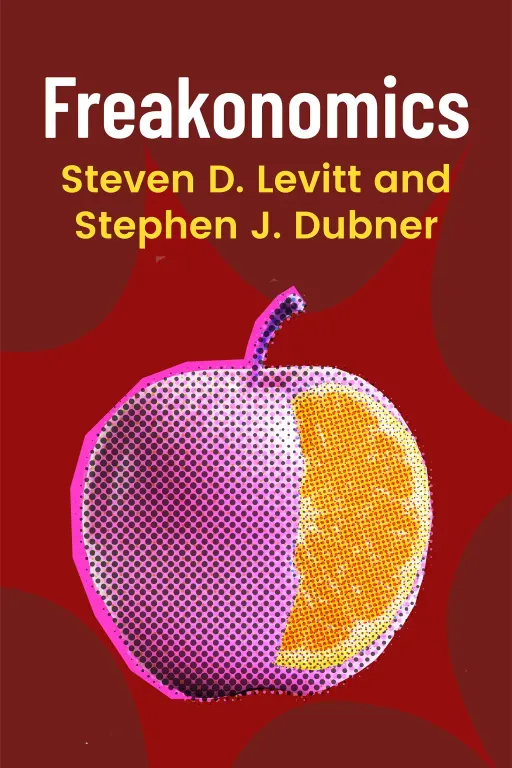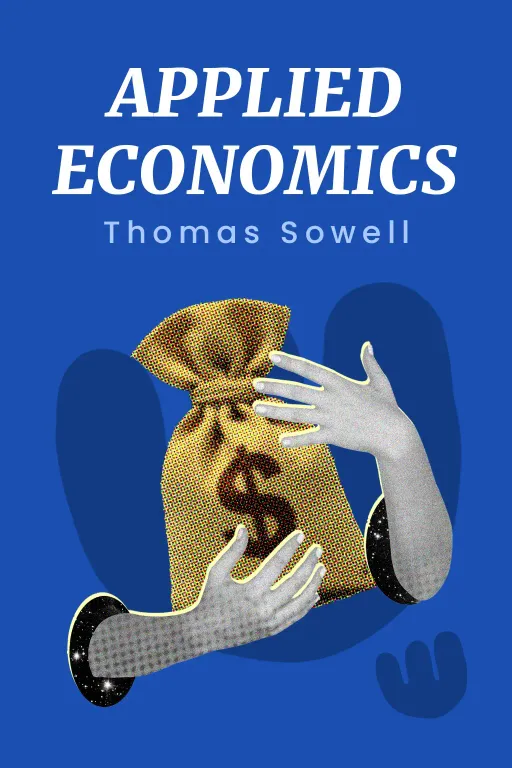
Decoding Human Nature: A Freakonomics Guide to Smarter Learning
11 minGolden Hook & Introduction
SECTION
Dr. Roland Steele: Imagine you're a teacher. Your job, your bonus, your entire school's reputation, hinges on one thing: your students' standardized test scores. The pressure is immense. What would you do to ensure they succeed? Would you… cheat? This is the kind of uncomfortable question at the heart of, the book that peeled back the surface of everyday life to reveal the strange mechanics underneath. And it’s exactly what we’re exploring today.
Dr. Roland Steele: I'm your host, Dr. Roland Steele, and with me is a guest who is perfectly suited for this conversation. Frank Wu is the co-founder of Aibrary, an AI company that's actively reshaping how we learn by turning books into personalized, podcast-style experiences. Frank, welcome.
Frank Wu: It's great to be here, Roland. is one of those foundational books for me. It teaches you to question everything, which is a prerequisite for anyone trying to build something new.
Dr. Roland Steele: I couldn't agree more. It’s about applying the tools of economics to riddles that most economists wouldn't touch. And that's our mission today. We're going to dive deep into this book from two powerful perspectives. First, we'll explore the double-edged sword of incentives and what happens when good intentions go horribly wrong.
Frank Wu: And then, I'm excited to talk about how information is the hidden currency of power, and what that means for learning in the digital age.
Dr. Roland Steele: Exactly. So let's get into it. The hidden side of everything.
Deep Dive into Core Topic 1: The Double-Edged Sword of Incentives
SECTION
Dr. Roland Steele: Frank, let's start with that teacher scenario I mentioned. It's not hypothetical. It's exactly what Steven Levitt and Stephen Dubner investigated in the Chicago public school system in the late 1990s. The city had just implemented a high-stakes testing policy. If a school's test scores were too low, it could be put on probation or even shut down. Teachers at underperforming schools could be denied raises or even fired. The incentive was crystal clear: improve test scores, or else.
Frank Wu: So you have this massive, top-down pressure. The intention is good—improve education—but the incentive is incredibly narrow. It's not "help children learn," it's "raise this specific number."
Dr. Roland Steele: Precisely. And Levitt, being an economist, suspected that such a strong incentive might lead to cheating. But how do you prove it? You can't just ask the teachers. So his team got the data—every single answer from every student's test, for years. They developed an algorithm to hunt for suspicious patterns. For instance, they looked for classrooms where students suddenly got a string of difficult questions right at the end of a test, after getting easy ones wrong. Or, even more cleverly, they looked for blocks of identical, unusual answers.
Frank Wu: They were looking for the statistical fingerprint of a teacher who had filled in the bubbles themselves.
Dr. Roland Steele: Exactly! And they found it. They could identify specific classrooms where, for example, the pattern of erasures—changing a wrong answer to a right one—was statistically impossible to be random. In some classes, the odds were one in a trillion. They found that in any given year, about 5 percent of elementary school teachers were likely cheating to boost their students' scores. When they presented this data to the Chicago school system, they re-tested some of the suspect classrooms under strict supervision. And just as the data predicted, those students' scores plummeted. The cheating was real.
Frank Wu: That is a chilling story. It's the classic "what gets measured gets managed" problem, but taken to a dark, logical extreme. The system wasn't incentivizing better teaching; it was incentivizing the appearance of better teaching. It makes you question the design of any performance-based system, from corporate KPIs to the leaderboards in educational apps. Are we rewarding true mastery, or are we just rewarding the skill of gaming the system?
Dr. Roland Steele: That's the perfect question. Because if you design the incentive incorrectly, you can get a result that's not just ineffective, but the complete opposite of what you intended. This brings me to another classic story from the book: the Israeli day-care centers.
Frank Wu: Ah yes, the fine for being late.
Dr. Roland Steele: That's the one. So, a group of economists studied several day-care centers that had a persistent problem: parents were always late to pick up their kids. This left teachers waiting around, unpaid and frustrated. The day-care wanted to stop this. So, they introduced a small fine—about $3—for any parent who was more than 10 minutes late. What do you think happened?
Frank Wu: Based on simple economics, you'd think lateness would decrease. A penalty should deter the behavior. But knowing this book, I'm guessing it went the other way.
Dr. Roland Steele: It went way up. The number of late-arriving parents more than doubled. The economists were stunned, but the logic, once you see it, is perfect. Before the fine, being late carried a penalty. Parents felt guilty for inconveniencing the teachers. It was a social contract. But the moment you put a price on it, you change the contract. It's no longer a moral failing; it's a market transaction. For $3, parents could buy themselves peace of mind and an extra 15 minutes. It was a bargain!
Frank Wu: You've just replaced a powerful, intrinsic motivator—guilt and social responsibility—with a weak, extrinsic one. And what's fascinating is that when they removed the fine, the lateness didn't go back down. The social contract was broken and couldn't be easily repaired.
Dr. Roland Steele: It stayed at the new, higher level. The damage was done.
Frank Wu: Wow. So in the Chicago case, a strong financial incentive led to widespread cheating. In the day-care case, a weak financial incentive destroyed a stronger moral one. It shows that human motivation isn't a simple input-output machine. You're dealing with complex social and moral frameworks, not just economic calculations. That's a huge, and frankly, humbling lesson for anyone trying to design a system to encourage a certain behavior, especially in learning.
Deep Dive into Core Topic 2: Information, the Hidden Currency of Power
SECTION
Dr. Roland Steele: Exactly. It's a minefield. And that complexity leads us to the second hidden force Levitt and Dubner explore, which is just as powerful: information. This brings us to one of the book's most brilliant and bizarre comparisons: How is the Ku Klux Klan like a group of real-estate agents?
Frank Wu: It sounds like the setup to a very strange joke. But I have a feeling the answer is all about who knows what.
Dr. Roland Steele: You've got it. The answer is that their power is derived, in large part, from hoarding information. Think about the KKK in its heyday. Its power wasn't just in its violence, but in its mystique. It was a secret society. They had secret handshakes, secret codes, secret rituals, and most importantly, secret membership lists. The fear came from not knowing who was a member. It could be your neighbor, your boss, the local sheriff. That information asymmetry—they know who they are, but you don't—was a massive source of their power.
Frank Wu: Okay, I see that. The unknown is terrifying. So how does that connect to a real-estate agent?
Dr. Roland Steele: Well, your real-estate agent is, hopefully, not a terrorist. But they also hold a significant informational advantage. They know the true market conditions, what houses are really selling for, how desperate the seller is, and what the buyer might be willing to pay. They tell you your house is worth, say, $500,000. Is it? Or would it be worth $550,000 if you waited another month? You don't know, but they have a much better idea. Their expertise is their power, and their incentive—a quick commission—might not align with your incentive, which is the highest possible price.
Frank Wu: That's it right there. That's the barrier that technology, and specifically AI, is meant to break down. An expert, whether it's a professor with specialized knowledge or a real-estate agent with market data, holds power because they hold information. The internet, and now AI, acts as a 'disinfectant,' to use the book's term. It levels the playing field by making that hidden information accessible to everyone.
Dr. Roland Steele: And gives a perfect historical example of this. A man named Stetson Kennedy infiltrated the KKK in the 1940s. He learned all their secrets—the passwords, the titles, the rituals. And what did he do with this terrifying information? He fed it to the writers of the radio show.
Frank Wu: No way.
Dr. Roland Steele: Yes. Suddenly, kids all across America were hearing Superman battle a new enemy, the "Clan of the Fiery Cross." The show used the KKK's actual secret codes and rituals. The Klan's terrifying mystique was turned into a plotline for a children's show. Their secrets became a joke. It made them look ridiculous and impotent, and recruitment plummeted. The simple act of releasing the information destroyed their power more effectively than any law could have at the time.
Frank Wu: That's incredible. It wasn't a weapon or a protest that did the most damage, but the simple act of making information public and accessible. It proves that transparency is one of the most powerful forces for change. It's the core belief behind open-source movements, and it's what we're trying to do with knowledge itself. We want to take the 'secret knowledge' locked away in books and make it universally accessible and understandable.
Synthesis & Takeaways
SECTION
Dr. Roland Steele: So, when we look at the world through a Freakonomics lens, we see these two powerful, invisible forces everywhere: incentives that shape our choices in weird and unexpected ways, and the flow of information that determines who holds power.
Frank Wu: They're the hidden levers of society. And what's striking is that most of us are completely unaware of how they're influencing our decisions every single day. We think we're making rational choices, but we're often just responding to a poorly designed incentive or acting on incomplete information.
Dr. Roland Steele: That's the whole thesis of the book in a nutshell. Morality represents how we'd like the world to work, but economics shows how it works.
Frank Wu: And that brings it all back to education and learning. For anyone trying to build something new in this space, the lesson from is profound. You can't just accept the conventional wisdom about how people learn or what motivates them.
Dr. Roland Steele: So what's the takeaway for our listeners, especially those trying to innovate?
Frank Wu: I think you have to become a 'rogue economist' in your own field. Question the conventional wisdom. Look at the data, not just the anecdotes. Analyze the incentives you're creating in your product, your company, or your classroom. Are you rewarding the right things? And most importantly, ask yourself: 'Who holds the information, and how can I democratize it?' That's not just how you build a good product; it's how you build a better, smarter world.
Dr. Roland Steele: A powerful call to action. Think like a freak to build a better future. Frank Wu, thank you so much for exploring the hidden side of everything with me today.
Frank Wu: The pleasure was all mine, Roland. Thanks for having me.









